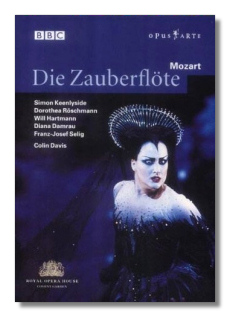
The Internet's Premier Classical Music Source
Related Links
- Mozart Reviews
- Latest Reviews
- More Reviews
-
By Composer
-
Collections
DVD & Blu-ray
Books
Concert Reviews
Articles/Interviews
Software
Audio
Search Amazon
Recommended Links
Site News
 DVD Review
DVD Review
Wolfgang Mozart

Die Zauberflöte (The Magic Flute)
- Dorothea Röschmann (Pamina)
- Will Hartmann (Tamino)
- Simon Keenlyside (Papageno)
- Franz-Josef Selig (Sarastro)
- Diana Damrau (Queen of the Night)
Orchestra & Chorus of the Royal Opera House, Covent Garden/Colin Davis
BBC Opus Arte DVD OA0886D NTSC (OA0885D PAL) 185m Anamorphic Widescreen Dolby Digital 5.1 & Stereo
Also available on Blu-ray OABD7002D: Amazon - UK - Germany - Canada - France - Japan - ArkivMusic - CD Universe - JPC
This production of Mozart's valedictory (but not final) opera is a curious but on the whole satisfactory mixture of the old and the new, and the antique and the modern. Veteran singers (Thomas Allen as the Speaker of the Temple, Richard Van Allan as the Second Priest!) share the stage with children (both literally and figuratively!) and scenic concepts dating from Mozart's time are realized using 21st-century technology. As I was watching this production – taped on January 27, 2003 – I had reservations, mostly concerning the singing. Still, those reservations melted away in the heat of the giant and glowing sun which dominates the final scene of this production. As the cliché goes, this production is more than the sum of its parts.
Colin Davis, although he remains unseen most of the time, is at the center of this Flute's success. Decades of experience with this score have taught him how to balance its gravity and lightness. The production was directed, on the other hand, by David McVicar, who is still quite young, and who has brought musical comedy flair to operas such as Carmen. McVicar doesn't do anything shocking to the Flute, but he does add some puzzling modern accents to a largely 18th-century design. The Queen of the Night and her entourage, for example, are "goth," and Papagena's costumes are contemporary trailer-park chic. Fortunately, McVicar never forgets that this is a magic flute, and this production is not lacking in the fantastic, nor is it deficient in humanity. McVicar finds the right equilibrium. The final stage picture – Tamino and Pamino silhouetted by a glowing sun as a passel of children scampers around them – is a stroke of genius.
Let's deliver the bad news first. The Sarastro is weak, and the Tamino too heavy and graceless. The smaller roles are variably cast, and some of the "Berlitz German" dialogues are jarring. Once one accepts that two of the lead characters are receiving less than ideal interpretations, there's plenty to enjoy. Keenlyside's Papageno steals the show. He is perfection in every way. The light touch of pathos he brings to "Ein Mädchen oder Weibchen" is typically thoughtful. Despite unflattering costumes, Dorothea Röschmann is a sympathetic and likeable Pamina, and well equipped to deal with the difficulties of "Ach! ich fühl's." As the Queen of the Night, Diana Damrau makes a powerful impression, even though Mozart doesn't give her much to do, but her Act Two aria brings down the house. Her difficult coloratura is delivered with both brilliance and vehemence, as befits the character. Ailish Tynan's zaftig Papagena also deserves to be mentioned.
The stereo sound is excellent, and so is the picture (Anamorphic Widescreen), despite the darkness of many of the scenes. There are three special features, but they are not quite up to Opus Arte standards: an illustrated synopsis, a superficial "behind the scenes" look at the production, and an interview with Colin Davis. There is considerable overlap between the last two features, however.
Despite some reservations, this is a Magic Flute with which most people will be perfectly happy.
Copyright © 2003, Raymond Tuttle





















